Mar 17, 2024 | Civil Rights Law, Constitutional Rights
The First Amendment of the Constitution states that “Congress shall make no law respecting an establishment of religion, or prohibiting the free exercise thereof; or abridging the freedom of speech, or of the press; or the right of the people to peacefully to assemble, and to petition the Government for a redress of grievances.” However, free speech isn’t an all-inclusive principle, meaning that there are some instances of speech and expression that the First Amendment doesn’t protect. What is protected speech?
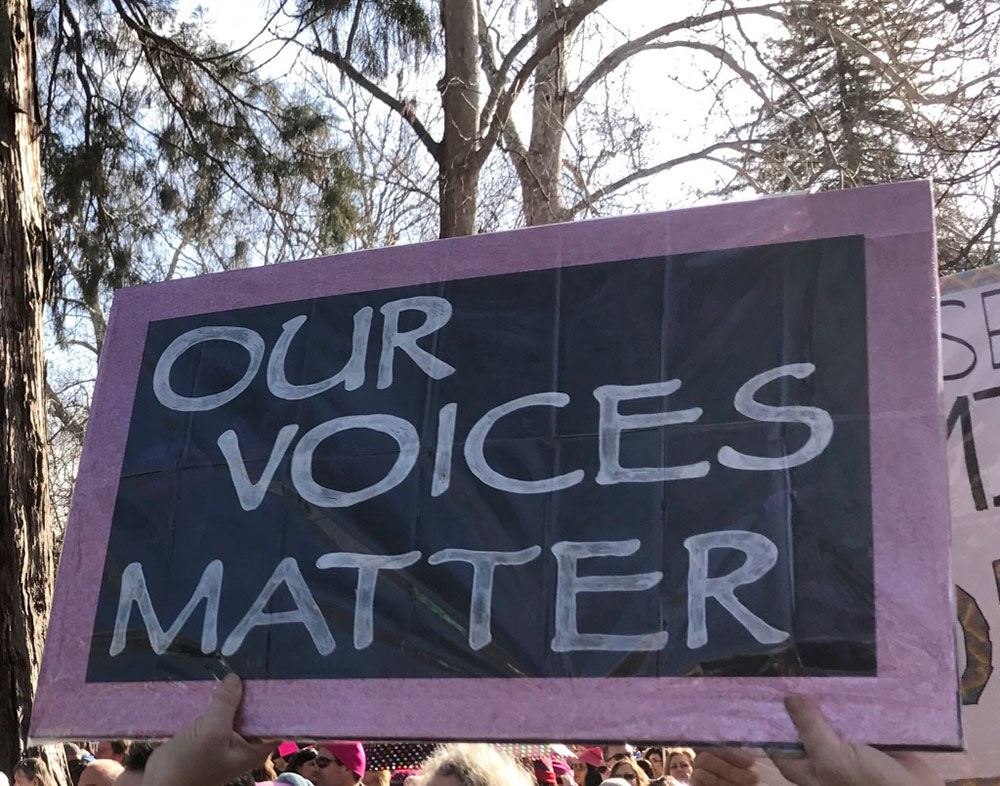
Free speech and protected speech
One reason for continually examining free speech is that the Constitution is vague. The Supreme Court further defined free speech: “If there is a bedrock principle underlying the First Amendment, it is that the government may not prohibit the expression of an idea simply because society finds the idea itself offensive or disagreeable” (Texas v. Johnson). This language restricts the government’s ability to constrain speech, but, the limitations of speech and expression often depend on context, such as a corporate office or a school.
Free speech laws are extremely complex, and it’s critical to remember that free speech doesn’t protect things like defamation and libel, threats, false advertising, and more.
Differences between protected speech and unprotected speech
There are many exceptions to free speech that the Supreme Court has supported for some time. For example, the Court has decided that the First Amendment provides no protections for things like obscenity, child pornography, or speech that constitutes true threats or “fighting words,” which may produce a clear and present danger. The Court provides less than full protections for many other types of speech, including:
- Commercial speech
- Defamation, libel, and slander
- Speech that might be harmful to children
- Speech broadcasts on television and radio
- Public employees’ speech
At the same time, the Supreme Court, as well as many government and nonprofit agencies, have contributed to the definition of protected speech as well. As a broad rule, virtually all other types of speech are protected, but the government may be able to regulate speech in certain circumstances. The government may attempt to regulate an act of free speech (including verbal communication as well as visual, art, music, theater, dance, literature, and more) through prior restraint. Additionally, acts that normally have the fullest First Amendment protections may still be restricted due to “regulations of the time, place, and manner of expression which are content-neutral, are narrowly tailored to serve a significant government interest, and leave open ample alternative channels of communication.”
What to do if your free speech rights were violated
To better understand what constitutes protected speech and unprotected speech (and therefore, your rights in Colorado regarding free speech), here are a few examples:
-
Subversive advocacy — Individuals can express lawlessness, but there is a limit to this protection. For subversive advocacy (expression promoting lawlessness) to fall outside of First Amendment protections, it needs to be directed at producing imminent lawless action and the speech needs to be likely to produce lawless action.
-
Fighting words — Similar to the above example, speech cannot incite clear and present danger or violence. However, fighting words often need to be insults personally directed at a person and not political statements that the person would find offensive. Provocative political speech is often fully protected, but not clear and directed insults designed to start a fight or a threat.
-
True threats — True threats are defined as “statements where the speaker means to communicate a serious expression of an intent to commit an act of unlawful violence to a particular individual or group of individuals.” As such, the speaker may not need to carry out the threat, but only to intently produce fear of bodily harm or death in the victim.
-
Obscenity — Material, speech, and/or expression must meet the following three standards to be considered obscene and not protected by First Amendment laws. These three standards include:
- Whether “the average person, applying contemporary community standards”, would find that the work, taken as a whole, appeals to the prurient interest
- Whether the work depicts or describes, in a patently offensive way, sexual conduct or excretory functions specifically defined by applicable state law
- Whether the work, taken as a whole, lacks serious literary, artistic, political, or scientific value.
-
Child pornography. Plainly put, child pornography is an unprotected category of expression.
-
Commercial expression that concerns illegal activity, or commercial expression that is false or misleading — Commercial speech is only protected if it contains legal activity and it’s content is true and not misleading.
Contact the Civil Rights Litigation Group in Denver
The Civil Rights Litigation Group deals with issues regarding free speech. First Amendment and protected speech legal cases can be extremely complex, but at the same time, it is clear when someone is making true threats, producing obscene material, or producing false advertising and misleading information. Fortunately, if your right to free speech is being regulated or restricted in any way — or you’re facing adverse repercussions for your speech, and your speech doesn’t fall under the umbrella of “unprotected speech”— then call the Civil Rights Litigation Group in Denver, CO. We offer free, no-obligation consultations.
Call our law offices today at 720-515-6165.
Oct 13, 2021 | Civil Rights Law, Constitutional Rights, Discrimination
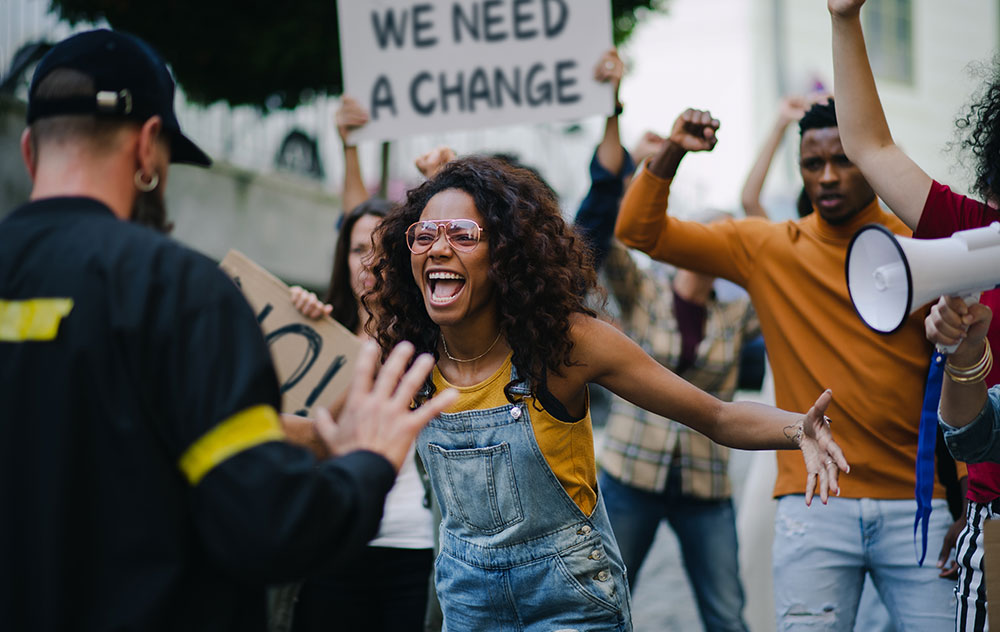 We often hear people talk about civil liberties and civil rights and how they are being violated, but do you actually know what they really are and what they afford you as an American? Simply put, they are the personal rights that are guaranteed by the U.S. Constitution and other federal laws enacted by Congress. They are designed to recognize the free-decision making required for individual autonomy and provide all Americans equal social opportunities and equal protection under the law regardless of race, religion, gender, age, or other personal characteristics. Aside from the rights and liberties expressly spelled out in the Bill of Rights, they include things like the Civil Rights Act of 1871, the Civil Rights Act of 1964, and the Americans with Disabilities Act of 1990.
We often hear people talk about civil liberties and civil rights and how they are being violated, but do you actually know what they really are and what they afford you as an American? Simply put, they are the personal rights that are guaranteed by the U.S. Constitution and other federal laws enacted by Congress. They are designed to recognize the free-decision making required for individual autonomy and provide all Americans equal social opportunities and equal protection under the law regardless of race, religion, gender, age, or other personal characteristics. Aside from the rights and liberties expressly spelled out in the Bill of Rights, they include things like the Civil Rights Act of 1871, the Civil Rights Act of 1964, and the Americans with Disabilities Act of 1990.
In the U.S., federal and state law has been enacted to prohibit discrimination based on protected-class characteristics (such as race, color, religion, creed, national origin, ancestry, gender, sexual orientation, pregnancy, age, disability, etc.) when it comes to things like education, employment, access to public assistance and facilities, housing, or healthcare, just to name a few. The great thing about our Constitution and our system of laws is that it’s possible to make changes over time to correct or add things the original framers didn’t necessarily take account of or which were against social norms in the 1700s. One big example is slavery, which was still legal in 1776 and widely practiced in the South. That civil rights change only came about because of the Civil War and even then people have had to continue to fight so that people of color would eventually be given the same rights and the same treatment as others. Other civil liberties and civil rights have been secured either by new legislation or court cases providing precedence. But all of these require continued vigilance and enforcement through litigation.
What’s the difference between civil liberties and civil rights?
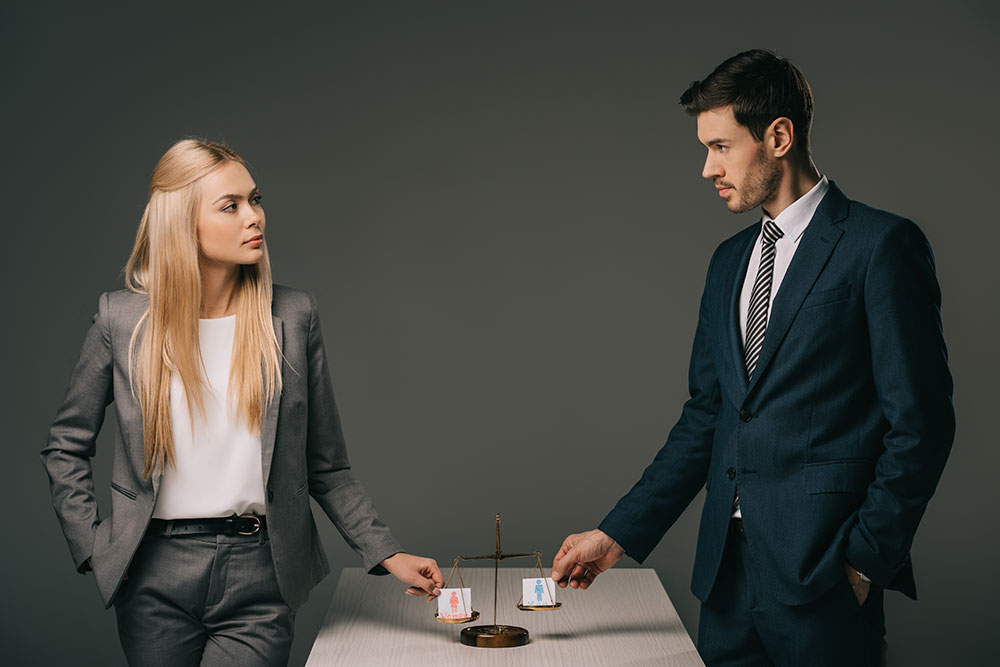 While the term “civil rights” generally refers to a broad scope of civil liberties and civil rights that persons in this country possess by virtue of restraint on our government, technically speaking, there are differences. Civil liberties specifically refer to basic freedoms enshrined in the Bill of Rights that create a space of freedom in which government actors are not supposed to encroach upon, while civil rights include not only space within which governmental actors should not encroach, but also affirmative laws that impose practical requirements to protect from discrimination. Many of your civil liberties are guaranteed by placing limits on what the government can do to you, such as limit your freedom of speech or imprison you without proper cause. Other civil liberties include the right to privacy, the right to remain silent, the right to a fair trial, and the right to vote, something that both women and people of color had to fight for as they were not similarly recognized in the original Constitution. Most recently, the LGBTQ community fought to guarantee the right to marry for same-sex couples, a civil liberty the original framers would likely not have ever formally considered.
While the term “civil rights” generally refers to a broad scope of civil liberties and civil rights that persons in this country possess by virtue of restraint on our government, technically speaking, there are differences. Civil liberties specifically refer to basic freedoms enshrined in the Bill of Rights that create a space of freedom in which government actors are not supposed to encroach upon, while civil rights include not only space within which governmental actors should not encroach, but also affirmative laws that impose practical requirements to protect from discrimination. Many of your civil liberties are guaranteed by placing limits on what the government can do to you, such as limit your freedom of speech or imprison you without proper cause. Other civil liberties include the right to privacy, the right to remain silent, the right to a fair trial, and the right to vote, something that both women and people of color had to fight for as they were not similarly recognized in the original Constitution. Most recently, the LGBTQ community fought to guarantee the right to marry for same-sex couples, a civil liberty the original framers would likely not have ever formally considered.
Affirmative civil rights laws beyond those contained in the Constitution, such as Title VII, are designed to protect people from discrimination in not only the public sphere, but also the private sphere. For example, an employer (whether government or private corporation) can’t lawfully choose to promote only the men in the company, or layoff people just because they are over 50. Women can no longer be fired or denied promotions for getting pregnant; in fact, employers must accommodate pregnant women in the workplace. Your doctor can’t deny you medical care because they don’t like people of your race. And schools must provide a free education to all children in the U.S. and can’t segregate them into different schools. This is an example of a right that was won by a court case in 1954, Brown v. Board of Education.
Fighting for your rights
Fighting for our civil rights, broadly, is something we all must continue to do because our system of governance requires vigilant recognition of the boundaries of our common rights and increasing recognition of rights needed to address marginalized people in our society, methods of ensuring fair and equal treatment under the law, and enforcement through lawsuits, because, unfortunately, not everyone follows the law. Much of the civil rights fight happens in the political world, through voting, protests, and other methods of speaking out. The death of George Floyd in May 2020 brought about huge civil rights protests in many U.S. cities. Those protests brought about change and many states have passed new laws, such as requiring the police to wear cameras to accurately record what they do. As lawyers, we support, but cannot directly assist with political efforts. But when it comes to enforcement of the law, we have the tools necessary to sue, for example, employers that continue to find ways to discriminate and government agencies like police departments that continue to violate people’s civil constitutional rights on a daily basis. We are 100% dedicated to using the law to enforce your civil liberties and rights from those who would seek to violate them. We broadly refer to these collection as civil rights.
We can fight for your civil liberties and civil rights
If you feel that your civil liberties or civil rights have been violated, we may be able to help. Whether your rights were violated by means of discrimination, police misconduct, or any other manner, it’s important for you to contact an attorney that specializes in civil rights as soon as possible. Many claims have a statute of limitations or other procedural deadlines that waive your right to sue if you wait too long, so time is of the essence. The Civil Rights Litigation Group has handled many civil rights and civil liberties cases and we offer free consultations so you can find out if you have a legitimate case and/or if the attorneys here may be a good match to represent you in your case.
Call the Civil Rights Litigation Group at (720) 515-6165 or use our online contact form to schedule your free consultation with us today.
Call (720) 515-6165
Feb 19, 2021 | Civil Rights Law, Employee Rights, Police Misconduct
 If you feel your civil rights have been violated, you will want to gather evidence to show that you have a case. In fact, obtaining information before you contact a lawyer is a good idea because many attorneys will want to see that information before deciding on whether to take on your case. The type of evidence and information your attorney needs is fairly straightforward, but the more you are prepared, the easier it will be. And don’t worry, you don’t need to be a private investigator or CSI fan to gather evidence — everything we’ve listed below is available from public records. Remember: the sooner you get all the evidence to your attorney, the faster the case can be reviewed and then you and your attorney can move forward with your case.
If you feel your civil rights have been violated, you will want to gather evidence to show that you have a case. In fact, obtaining information before you contact a lawyer is a good idea because many attorneys will want to see that information before deciding on whether to take on your case. The type of evidence and information your attorney needs is fairly straightforward, but the more you are prepared, the easier it will be. And don’t worry, you don’t need to be a private investigator or CSI fan to gather evidence — everything we’ve listed below is available from public records. Remember: the sooner you get all the evidence to your attorney, the faster the case can be reviewed and then you and your attorney can move forward with your case.
The initial statement
Before you start to gather evidence, the first thing we recommend is to write out a detailed statement for your attorney describing everything about your case, such as:
-
What date(s) did the incident(s) occur? If there were multiple incidents, describe each one in a timeline format, starting with the date of each incident, and include all details about each incident by date.
-
Everything that was said and done between you and the person(s) involved. Who was involved? What department or company were they working for at the time? What happened during the incident?
-
Who was involved? Are there any witnesses and, if so, include their contact information and what you believe they would say if called to provide testimony.
-
Identify corroborating evidence. Do you have any corroborating evidence regarding the incident that helps show your version of events is more accurate than othe persons, such as emails, voicemails, texts, video or audio recordings, etc.? Colorado is a one-party consent-to-record state. Generally, people have a right to audio-record as long as one party to a conversation (usually you) consents to the recording. Thus, typically, other people do not need to consent for you to record legally. [1]
-
How were your rights violated? If a police, jail, prison or corporate official violated your rights, identify (to the best of your ability) who that was and what they did that makes you believe the conduct at issue violated your rights.
As time passes, so do the memories of some important details. Writing down this information for your attorney can help you remember and serve as a reminder for you and/or your attorney later.
On that note, see our previous blog post on how long a civil rights case takes.
 How to gather evidence regarding injuries and/or medical records
How to gather evidence regarding injuries and/or medical records
If your case involves injuries, you will want to document your injuries with photographs, video, and/or going to see a qualified medical provider. If you were taken to a hospital or see a medical provider, you can contact them directly and request disclosure of your medical records from the provider’s records department by filling out a HIPAA-Compliant request/release of records. If you were injured while in jail and treated there, you can get medical records either from the Colorado Department of Corrections or the county jail in the city where you were held. Once you call, always ask to be transferred to the records department before you make a records request and fill out the appropriate forms to request your records.
How to gather evidence from the police, sheriff’s department, jail or other law enforcement agency
If you are pursuing a civil rights case that involves the police, you are allowed to gather evidence from law enforcement agency records departments. Typically, criminal justice and/or police records are public information. Police agencies cannot unreasonably withhold this type of information (whether requested by you or someone on your behalf), if you request it properly, including:
- Police or jail records showing arrests, detentions, booking/releases, the time you spent in jail, and/or any incident reports regarding specific incidents or occurrences.
- Video footage of you, including body cameras, surveillance video, or video taken by third parties that was obtained by law enforcement authorities.
- Any police reports on your case, including dispatch records and body camera reports.
How do I get my records from the police department sheriff’s department, jail or other law enforcement agencies
Every state is different, but the first thing you need to do is contact the police agency involved and ask for the records department. Then you will need to fill out a FOIA (Freedom of Information Act) request (for federal agencies) or a CORA/CCJRA (Colorado Open Records Act/ Colorado Criminal Justice Records Act) request for local police departments to obtain your records. The Colorado Open Records Act (1968), gives the public access to all government records except criminal justice records. Here’s a good article describing the difference between CORA and CCJRA requests and how to file them when you need to gather evidence. Usually, a person requesting records should do so by noting your right to records under CORA and/or the CCJRA, or simply by filling out and submitting the agency forms for such requests.
Occasionally, there may be some fees associated with obtaining these records based on the number of pages you request, or the time required to investigate and locate information. But this usually only occurs when there is a lot of information requested. In many cases you can request a fee waiver. In Colorado, you can get the fee information on the Attorney General’s website and on the CORA website, which has links to the forms that you will need to fill out (see the general CORA request form or the CORA Information and Procedure website for request procedures).
Here are some other agencies you can contact to obtain records and gather evidence:
DORA Public Information and Records: Scroll down to the bottom of the page to see a list of all the CORA Custodians who can help with specific types of records, such as the Civil Rights Division. This website is specific to Colorado.
City and County of Denver Police Records: On this website, you can request many types of police records, such as arrest records and photos, accident and offense reports, 911 recordings, investigation reports, and audio and video recordings. Some of these records require a fee, which is listed on the site, and most can be ordered online. If you are in another county, look up the county name and ‘police records’.
Colorado Court Records: On this site, you can look up court documents in Colorado.
Colorado Department of Corrections: You can look up offender records for the state. On the City and County of Denver website, you can look up inmates being held in Denver jails.
A-Z Index of U.S. Government Departments and Agencies: This website has a complete list of all U.S. agencies, including contact information, for any FOIA requests.
How to find the right attorney
If you believe your rights have been violated, whether it’s discrimination or police misconduct or any other civil rights matter, it’s important for you to contact an attorney who specializes in civil rights cases as soon as possible. Many claims have a statute of limitations, so time is of the essence. The Civil Rights Litigation Group has successfully handled many civil rights cases over the past 10 years and we are 100% dedicated to civil rights issues. We offer free consultations so you can find out if you have a legitimate case. Please call us at 720-515-6165.
Call 720-515-6165 for a free consultation.
[1] This may not always be available, for example if your company or department specifically prohibits all recording due to sensitive security concerns.
Jul 21, 2020 | Civil Rights Law, Constitutional Rights, Employee Rights
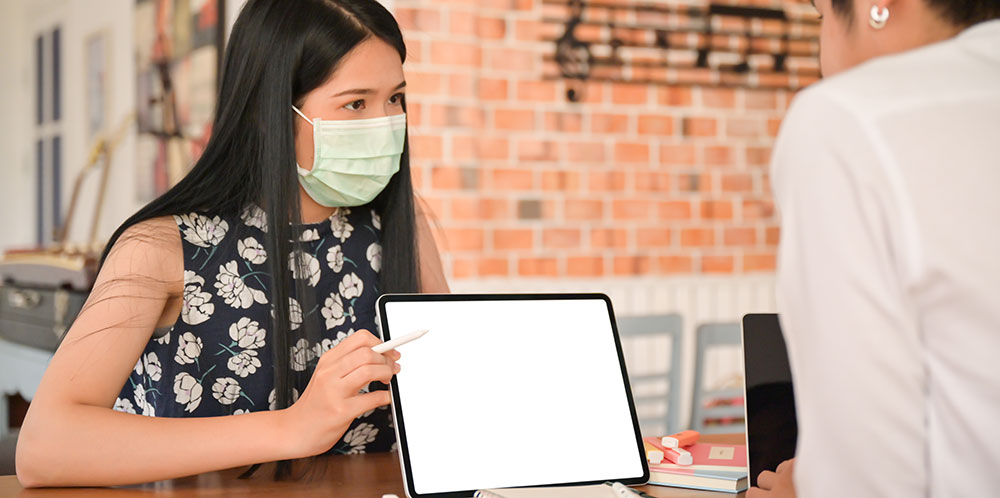 Amidst all the civil rights protests lately, one divisive topic has emerged: Is it a violation of my civil rights for the government to require me to wear a face mask in public? In short, probably not. Because of the rapid increase in Covid-19 infections, many states have issued temporary laws, requiring all citizens (over the age of 11, in Colorado) to wear face masks. In Colorado, it applies while “entering or moving within any public indoor space [or] while using or waiting to use public (buses, light-rail) or non-personal (taxis, car services, ride-shares) transportation services.” You aren’t required to wear them in private residences or when outdoors, unless you are waiting for public transportation. Given the public-available data on the Covid pandemic, face-mask orders probably bear a reasonable relationship to the emergency and are probably legal, based on pre-existing case law.
Amidst all the civil rights protests lately, one divisive topic has emerged: Is it a violation of my civil rights for the government to require me to wear a face mask in public? In short, probably not. Because of the rapid increase in Covid-19 infections, many states have issued temporary laws, requiring all citizens (over the age of 11, in Colorado) to wear face masks. In Colorado, it applies while “entering or moving within any public indoor space [or] while using or waiting to use public (buses, light-rail) or non-personal (taxis, car services, ride-shares) transportation services.” You aren’t required to wear them in private residences or when outdoors, unless you are waiting for public transportation. Given the public-available data on the Covid pandemic, face-mask orders probably bear a reasonable relationship to the emergency and are probably legal, based on pre-existing case law.
Does the government have the legal authority to mandate face masks?
Probably. Since we are in the middle of a public health emergency, state and local officials have the authority to issue and enforce reasonable rules of safety. According to Colorado Attorney General Phil Weiser, “This has been upheld repeatedly. No one has the right to expose the community to communicable disease.” Likewise, Colorado Governor Jared Polis has emergency powers that grant him the right to issue the face mask mandate, and that authority is upheld by the Colorado state constitution (Article IV, Section 2). A law passed by the legislature: Colorado Disaster Emergency Act, CRS 24-33.5-701 also supports this.
A state government’s power to issue orders that are reasonably related to the protection of other citizens during public health emergencies has also been upheld by the Supreme Court. This has been the case since 1905, when the Supreme Court ruled on Jacobson v. Massachusetts. The case involved a smallpox outbreak and local authorities mandated that everyone had to be vaccinated against it or risk a fine (unless medically unable to do so safely). The court upheld this authority, saying, “Upon the principle of self-defense, of paramount necessity, a community has the right to protect itself against an epidemic of disease which threatens the safety of its members.”
“The public health expert consensus is that wearing a mask in public is a key countermeasure in combating the coronavirus pandemic because it helps slow the infection rate. Even cloth face masks can help curb community spread of coronavirus, in part by reducing transmission by people who are infected but experience no symptoms. The coronavirus pandemic is the kind of extraordinary circumstance when the public good outweighs individual inconvenience.” (Law.com)
To date, over 500,000 Americans have died from Covid-19, so it is likely within each state government’s authority to mandate necessary requirements issued for the purpose of protecting the health and safety of those who have not yet been infected, so long as those requirements relate directly to the cause at hand. Since Covid-19 has been shown to be spread by people breathing out tiny droplets that may contain the virus, face masks are likely to be considered a reasonable precaution. Face mask requirements are even more likely to be considered reasonable considering that many people who have the virus are asymptomatic and may unknowingly spread it to others. To date, the Supreme Court has had the opportunity to revisit this issue, several times, but has declined in all but religious liberty cases, where certain government’s have been deemed to have applied face mask mandates inequitably to religious institutions and/or religious activates, as compared to similarly situated secular institutions/activities.
Can I be required to wear face mask if I have a medical condition?
For those people “who cannot medically tolerate a face covering,” the ADA (Americans with Disabilities Act) requires that businesses, government entities, etc. make reasonable accommodations. Those may include offering delivery or curb-side pickup of things like groceries and goods, or offering online options for accessing services such as renewing a license. However, they aren’t required to allow you in their space without a mask, as that could endanger others.
The definition for those medically exempt from the order is pretty narrow: “a person who has trouble breathing or anyone who is unconscious, incapacitated, or otherwise unable to remove the cloth face-covering without assistance.” It doesn’t include people who believe the mask will cause them to breathe in carbon dioxide or lower their oxygen levels.
The ADA has also issued a warning against using fake mask exemption cards that have flooded the internet. “The ADA does not provide a blanket exemption to people with disabilities from complying with legitimate safety requirements necessary for safe operations.” (ADA website)

Can a business refuse me entry if I won’t wear a mask?
Not only can a business refuse you entry, but they may be required to as they are responsible for upholding the state and local laws for face masks and other safety measures. Again, they have to make reasonable accommodations for those with disabilities, so if you suffer from a disability, you should be prepared to make a specific request for accommodation that will not create an undue burden on the business. But as long as the business is enforcing the mask requirement equally to everyone, they are probably not violating your rights. Businesses are also required to post signage stating that masks are required. If you attempt to enter a business without a mask, you could be subject to allegations of trespassing. Likewise, businesses that do not enforce the ordinance may lose their license.
Can my employer require me to wear face masks?
Because of the mandate, employers must require all employees to wear masks. They have to make reasonable accommodations for employees with disabilities and should offer protection to those at a greater risk of severe illness due to Covid-19. Some employers may require employees to wear additional protective gear, such as gloves, and some are required to per Public Health Order 20-31.
If you are in a job that requires specific high-end protective gear like N95 masks, employers in Colorado are required to provide them. For all other businesses, government entities, etc. the Safer at Home public health order from March states that employers shall “provide appropriate protective gear like gloves, masks, and face coverings.” The newest public health order states that employers “should” provide protective equipment, but doesn’t specifically mandate it.
Regardless, employers are still required to provide workplaces “free from recognized hazards likely to cause death or serious physical harm” under the Occupational Safety and Health Act’s General Duty Clause. This is interpreted differently for each business and can include things like putting up clear barriers to protect employees who come in close contact with the public.
Other resources on our blog:
Additional resources:
Face-Covering Requirements and the Constitution
Colorado Mask Order: When Do I Need To Wear A Face Covering? (And More Mask Questions Answered)
Questions & answers about the statewide mandatory mask order
Considerations for Wearing Cloth Face Coverings
May 27, 2020 | Civil Rights Law, Constitutional Rights, Police Misconduct
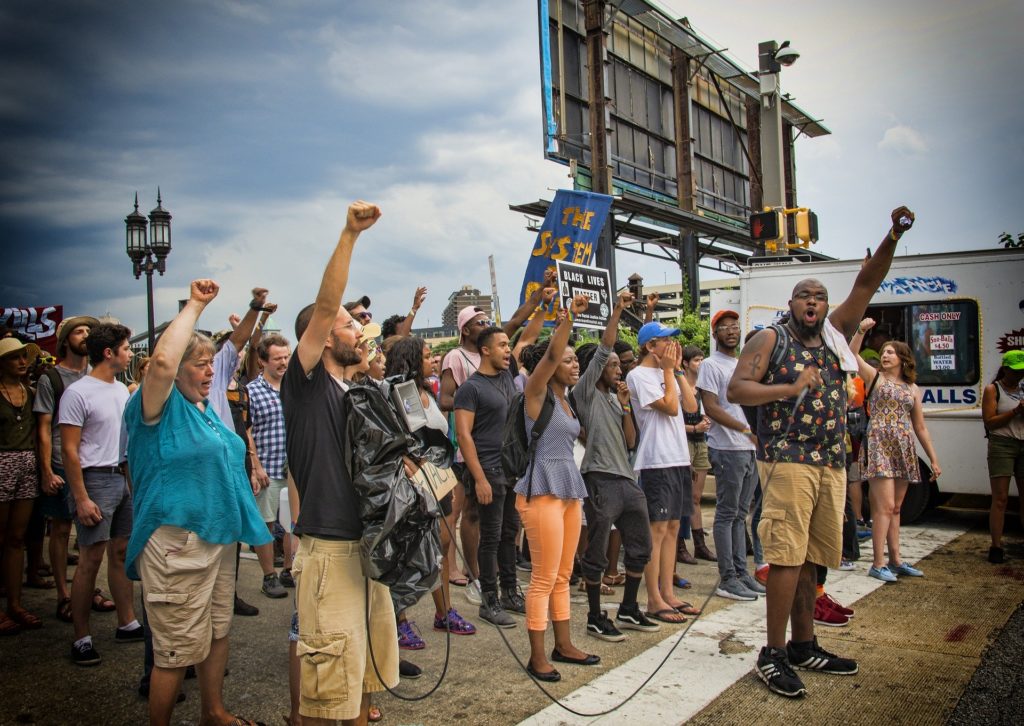 The most important thing to remember is that the First Amendment guarantees every person in America the right to peacefully assemble and protest.
The most important thing to remember is that the First Amendment guarantees every person in America the right to peacefully assemble and protest.
Congress shall make no law respecting an establishment of religion, or prohibiting the free exercise thereof; or abridging the freedom of speech, or of the press; or the right of the people peaceably to assemble, and to petition the government for a redress of grievances.
The right to protest is valued in our country and has led to many substantial changes over the past 200 years, such as the Civil Rights Act. When outrageous police abuse occurs — such as the killing of George Floyd in Minneapolis or the beating of Rodney King in Los Angeles — that conduct affects us all. Exercising your right to speak up and to protest could foster recognition, awareness, and much needed change in the future.
However, it’s important to remember that the Supreme Court has recognized limits to the exercise of our rights – when they could affect the rights of others. Just like freedom of speech doesn’t provide the right to publicly lie about someone or the right to yell fire in a crowded theater, the right to assemble does not mean that a protester has cart-blanche protection to commit otherwise illegal acts, such as vandalism, and there could be criminal repercussions for those who harm others.
Also, current law permits “reasonable time, place, and manner” restrictions by governments to limit some of the unintended adverse effects of those who gather to speak in local communities. Legal interpretations of what constitutes “reasonable” time, place and manner restrictions can be nuanced, but they usually permit municipal action to do things like restrict protesters from marching down the middle of busy streets or instituting non-discriminatory curfews to curb looting and vandalism. Protesters have more leeway regarding location and time when a protest is spontaneous, such as immediately after a major incident occurs that calls for public outcry, like the events in recent days. However, the protection for spontaneous association will likely be subject to greater “time, place, and manner” restrictions after initial protests erupt and/or after public safety concerns surface.
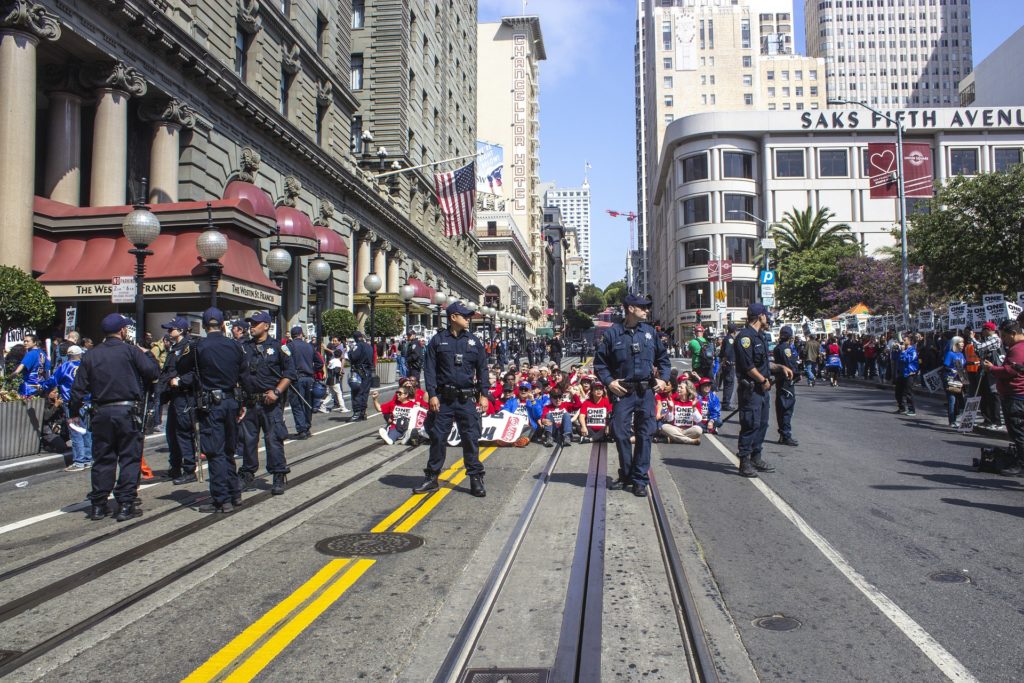
When can the police interfere with protests?
If a protest escalates to include violence and property damage, local law enforcement has the legal authority to intervene to quell that violence or to arrest perpetrators. They may also have the legal authority to stop protests on private property, those organized without a permit, or those that block public rights of way, such as on an interstate or major street.
As to the time or duration of protests, law enforcement can intervene if a curfew has been legally established and police have given you warning, time, and opportunity to safely leave. Police should act only to apply limited restrictions in a non-discriminatory and even-handed manner.
What am I allowed to record at a protest?
There have been a lot of contrary opinions written regarding what citizens can and can’t record, with respect to the police. And while some states have limits on where you can post recordings with audio, the visual part of recordings is protected by the First Amendment and can be posted online and shared.
You have a First Amendment right to record the police while they are performing public duties. As long as you aren’t interfering with or threatening them, and stay a fair distance away from officers performing official functions, the police DO NOT have the legal authority to demand that you stop recording. In fact, it’s always a good idea to record any encounter with the police if you think things might go bad for anyone involved. Phone recordings have been key in prosecuting police misconduct in recent years, especially with the quality of video that most cell phones can produce. As Will Smith said, “Racism isn’t getting worse, it’s getting filmed.”
Also, the police cannot legally demand your phone or confiscate it without a warrant, and those take time to obtain because they have to be signed by a judge. They also don’t have the authority to tell you to delete a photo or video. If you feel a confrontation may occur — especially one involving force — many have suggested complying, handing over the device, and then filing a complaint with Internal Affairs, the Office of the Independent Monitor (in Denver), or legal organizations like the ACLU or with local lawyers. But you absolutely have the right to retain possession of your phone along with any video or photos. If nothing else, quickly send or upload the media to someone before handing over your phone so that it cannot be deleted. The ACLU has developed a smart phone application that – once activated – will record and automatically upload any video taken from that phone to the ACLU for safe-keeping and later review:
https://www.aclu.org/issues/criminal-law-reform/reforming-police/aclu-apps-record-police-conduct
If you don’t like your own photo being taken or publicly shared, you should know that your presence at a public protest means you have given consent for your photo to be taken and potentially used, most commonly by the media. After-all, protests are meant to be matters of public interest. There are a few restrictions, but if you are uncomfortable with your photo showing up on social media or potentially the evening news, you should consider other forms of speech or wearing something that hides your identity.
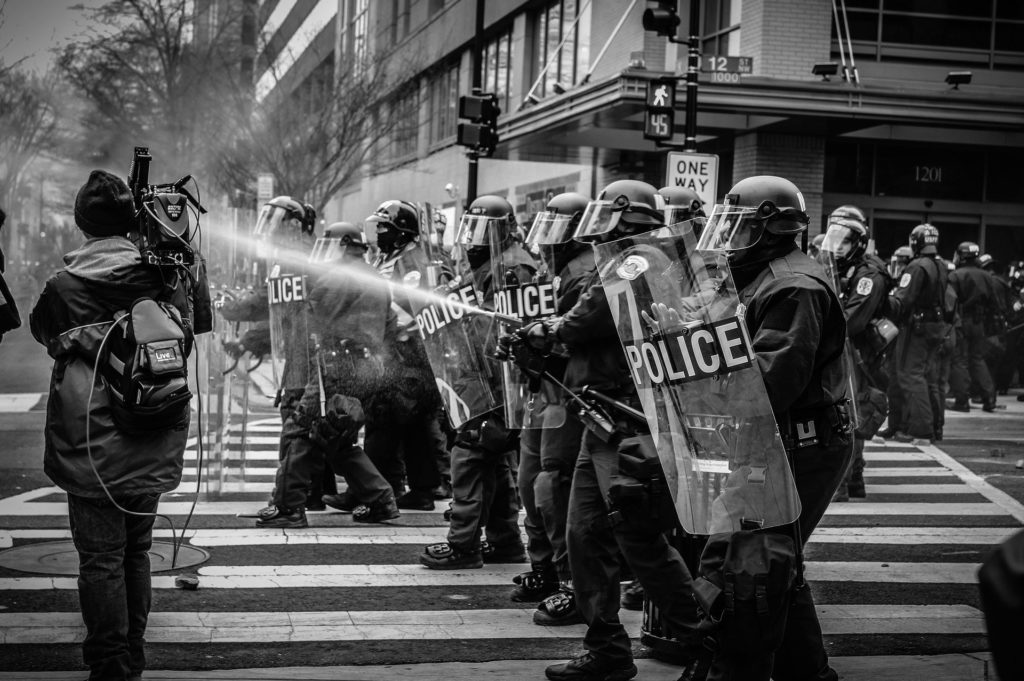
What are the police allowed to do during a protest?
The first job of the police is to protect your right to peacefully assemble — both they and public officials have taken a vow to uphold the Constitution. If you are acting reasonably, within the confines of the law, then they have no authority to act against you or restrain you in any way. However, they are also charged with maintaining order and upholding the law, so if protesters or infiltrators start being violent or causing damage then the police will most likely take action. The concern for all of us is what form that action takes and whether it is proportionate to the public policy and/or legal justifications permitted under the law.
The main priority of police should be to de-escalate violence, but it has been shown time and again that the police often are the cause of violence. For example, if they start dropping tear gas canisters and firing rubber bullets at peaceful protesters before curfew has started, and without any legal and/or legitimate purpose, then they could be found liable for use of excessive force. This is one of the times when it is important to always be recording police on your phone.
What should I do if the police stop me or if I get arrested?
First of all, it’s always good to stay calm. Remember that sometimes the police just want to ask a question and you may not be suspected of doing anything wrong. The law permits police to ask questions without converting the contact into a seizure. Second, get your phone out and start recording. Finally, you always have the right to ask the police if you are being detained and/or free to go. If they indicate you are not being detained or are free to go, just calmly leave — you are under no obligation to speak to them. If they detain you, you have the right to ask why you are being detained.
If you are arrested or detained — whether justified or not — it’s best to remain calm and not resist. If other people are there, ask them to record everything they can. You do not have to speak to the police if you don’t want to — you have the right to remain silent. After you are booked, you will have the right to make a phone call so it’s a good idea to write a few numbers on your arm since your phone will be taken away. And it’s always a good idea to call a lawyer because while that conversation is privileged, the police do have the authority to listen in on calls to friends or family.
What should I do if I feel my rights were violated at a protest?
If you truly feel your rights were violated, the first step is always to gather evidence to support you. You have the right to sue for the violation of your rights and you should contact a civil rights attorney devoted to your rights. 42 U.S.C. Section 1983 of federal law permits those who are violated by official government actors (such as police) to seek redress in federal court. However, police officers are also covered by qualified immunity, which means they are shielded from civil liability if they didn’t break a clearly established law. That is one reason it is so important to record any interaction with the police as many of them are still not required to wear body cameras. Recordings remove much of the grey area of “he said, she said” when courts are charged with determining who is telling the truth. Video doesn’t lie.
We are here to help with protecting your Constitutional right to protest
If you have experienced problems with your civil rights being violated during a protest, please give us a call. We work diligently to protect constitutional rights. For a free, no-obligation consultation with the Civil Rights Litigation Group, contact our Denver CO law firm today at (720) 515-6165 or use our online contact form.



 We often hear people talk about civil liberties and civil rights and how they are being violated, but do you actually know what they really are and what they afford you as an American? Simply put, they are the personal rights that are guaranteed by the U.S. Constitution and other federal laws enacted by Congress. They are designed to recognize the free-decision making required for individual autonomy and provide all Americans equal social opportunities and equal protection under the law regardless of race, religion, gender, age, or other personal characteristics. Aside from the rights and liberties expressly spelled out in the
We often hear people talk about civil liberties and civil rights and how they are being violated, but do you actually know what they really are and what they afford you as an American? Simply put, they are the personal rights that are guaranteed by the U.S. Constitution and other federal laws enacted by Congress. They are designed to recognize the free-decision making required for individual autonomy and provide all Americans equal social opportunities and equal protection under the law regardless of race, religion, gender, age, or other personal characteristics. Aside from the rights and liberties expressly spelled out in the  While the term “civil rights” generally refers to a broad scope of civil liberties and civil rights that persons in this country possess by virtue of restraint on our government, technically speaking, there are differences. Civil liberties specifically refer to basic freedoms enshrined in the Bill of Rights that create a space of freedom in which government actors are not supposed to encroach upon, while civil rights include not only space within which governmental actors should not encroach, but also affirmative laws that impose practical requirements to protect from discrimination. Many of your civil liberties are guaranteed by placing limits on what the government can do to you, such as limit your freedom of speech or imprison you without proper cause. Other civil liberties include the right to privacy, the right to remain silent, the right to a fair trial, and the right to vote, something that both women and people of color had to fight for as they were not similarly recognized in the original Constitution. Most recently, the LGBTQ community fought to guarantee the right to marry for same-sex couples, a civil liberty the original framers would likely not have ever formally considered.
While the term “civil rights” generally refers to a broad scope of civil liberties and civil rights that persons in this country possess by virtue of restraint on our government, technically speaking, there are differences. Civil liberties specifically refer to basic freedoms enshrined in the Bill of Rights that create a space of freedom in which government actors are not supposed to encroach upon, while civil rights include not only space within which governmental actors should not encroach, but also affirmative laws that impose practical requirements to protect from discrimination. Many of your civil liberties are guaranteed by placing limits on what the government can do to you, such as limit your freedom of speech or imprison you without proper cause. Other civil liberties include the right to privacy, the right to remain silent, the right to a fair trial, and the right to vote, something that both women and people of color had to fight for as they were not similarly recognized in the original Constitution. Most recently, the LGBTQ community fought to guarantee the right to marry for same-sex couples, a civil liberty the original framers would likely not have ever formally considered. If you feel your civil rights have been violated, you will want to gather evidence to show that you have a case. In fact, obtaining information before you contact a lawyer is a good idea because many attorneys will want to see that information before deciding on whether to take on your case. The type of evidence and information your attorney needs is fairly straightforward, but the more you are prepared, the easier it will be. And don’t worry, you don’t need to be a private investigator or CSI fan to gather evidence — everything we’ve listed below is available from public records. Remember: the sooner you get all the evidence to your attorney, the faster the case can be reviewed and then you and your attorney can move forward with your case.
If you feel your civil rights have been violated, you will want to gather evidence to show that you have a case. In fact, obtaining information before you contact a lawyer is a good idea because many attorneys will want to see that information before deciding on whether to take on your case. The type of evidence and information your attorney needs is fairly straightforward, but the more you are prepared, the easier it will be. And don’t worry, you don’t need to be a private investigator or CSI fan to gather evidence — everything we’ve listed below is available from public records. Remember: the sooner you get all the evidence to your attorney, the faster the case can be reviewed and then you and your attorney can move forward with your case. How to gather evidence regarding injuries and/or medical records
How to gather evidence regarding injuries and/or medical records Amidst all the civil rights protests lately, one divisive topic has emerged: Is it a violation of my civil rights for the government to require me to wear a face mask in public? In short, probably not. Because of the rapid increase in Covid-19 infections, many states have issued temporary laws, requiring all citizens (over the age of 11, in Colorado) to wear face masks. In Colorado, it applies while “entering or moving within any public indoor space [or] while using or waiting to use public (buses, light-rail) or non-personal (taxis, car services, ride-shares) transportation services.” You aren’t required to wear them in private residences or when outdoors, unless you are waiting for public transportation. Given the public-available data on the Covid pandemic, face-mask orders probably bear a reasonable relationship to the emergency and are probably legal, based on pre-existing case law.
Amidst all the civil rights protests lately, one divisive topic has emerged: Is it a violation of my civil rights for the government to require me to wear a face mask in public? In short, probably not. Because of the rapid increase in Covid-19 infections, many states have issued temporary laws, requiring all citizens (over the age of 11, in Colorado) to wear face masks. In Colorado, it applies while “entering or moving within any public indoor space [or] while using or waiting to use public (buses, light-rail) or non-personal (taxis, car services, ride-shares) transportation services.” You aren’t required to wear them in private residences or when outdoors, unless you are waiting for public transportation. Given the public-available data on the Covid pandemic, face-mask orders probably bear a reasonable relationship to the emergency and are probably legal, based on pre-existing case law.
 The most important thing to remember is that the First Amendment guarantees every person in America the right to peacefully assemble and protest.
The most important thing to remember is that the First Amendment guarantees every person in America the right to peacefully assemble and protest.
